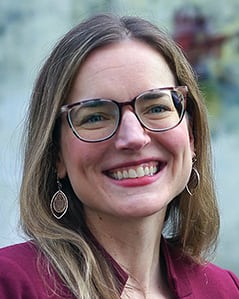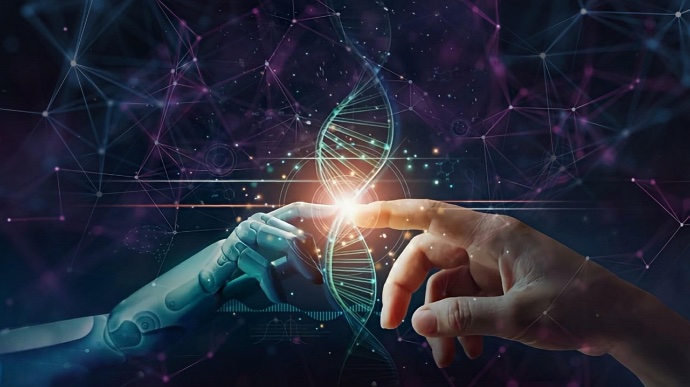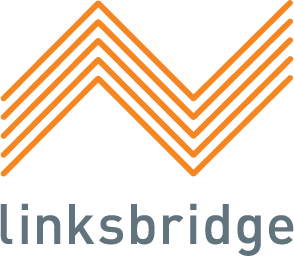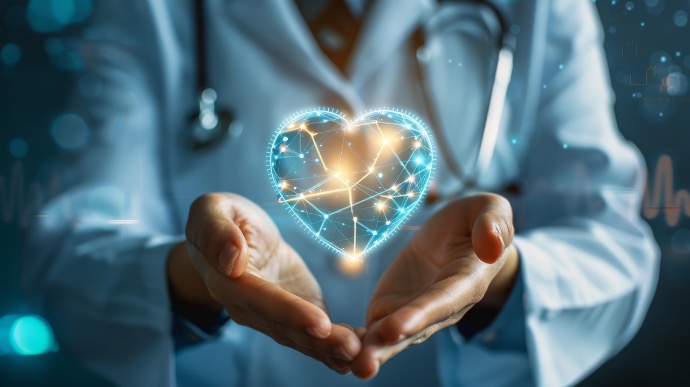April 2025 Issue Campaign
IN THIS ISSUE
- Letter from our Executive Director
- Issue Brief: Artificial Intelligence in Healthcare: Why it’s Here to Stay
- Organization Profile: AI with Accountability: PATH’s Approach to Smarter, Stronger Health Systems
- Goalmaker: Dr. Kingsley Ndoh, Clinical Assistant Professor, UW Department of Global Health; Founder and CEO of Hurone AI; Affiliate Member, Vaccines & Infectious Disease Division, Fred Hutch Cancer Center
- Member Blogs about Good Health and Well Being
Letter from our Executive Director

AI is rapidly transforming healthcare—from automating administrative tasks to advancing drug discovery and improving diagnostic accuracy. Its potential to drive global health equity is especially exciting. Organizations like PATH are leading the way, building AI tools not just for diagnostics, but also for medical supply chain optimization and data management. VillageReach is using AI chatbots to support frontline health workers in Malawi, and the Gates Foundation is investing in tools that streamline medical record generation and flag dangerous symptoms in vulnerable communities.
Yet, responsible implementation is critical. Concerns around data privacy, bias, and ethical use remain central to the conversation. The Fred Hutch-led Cancer AI Alliance (CAIA) is one example of how innovation and ethics can align. By training models on localized patient data and sharing only aggregated insights, CAIA protects patient privacy while accelerating cancer research.
AI offers immense opportunity—especially in low- and middle-income countries where early adoption could increase efficiency and reduce long-term costs. But human oversight, strong governance, and context-specific design must guide its development. As AI’s role in healthcare grows, I’m inspired by the innovative, equity-driven work of GlobalWA members.
I’d also like to take this opportunity to thank outgoing Communications Director Joel Meyers for his 4 years of service to Global Washington. We’re grateful for all of Joel’s contributions and wish him the best in his next chapter. You can reach out to Joel on LinkedIn to stay in touch.
Elizabeth Stokely
Executive Director
Issue Brief
Artificial Intelligence in Healthcare: Why it’s Here to Stay
By Aneesh Chatterjee

Illustration by PlacidPlace/Pixabay
The advent of AI has revolutionized healthcare. AI tools are optimizing everything from transcription to drug discovery and development, day-to-day consults by healthcare professionals, and optimizations in administration and logistics. The industry and those working to improve global health – including NGOs, governments and private sector actors – face the quandary of adoption, and the ethical concerns that come with it. To that end, several GlobalWA members demonstrate the proven benefits of AI utilization, while nascent research in the field unveils clear strategies for addressing the ethical concerns surrounding the subject.


One of the strongest catalysts for progress in the global health development space is the adoption and deployment of generative AI and LLMs, according to Linksbridge. The impact of AI on how NGOs and governments can leverage data in matters of healthcare will be unprecedented, primarily by broadening ease of access to data and streamlining the extrapolation of insights. Beyond data, AI has also proven effective as an assistant tool for conducting logistical and clerical work. AI assistance plays a critical role in the healthcare sector in Malawi, as reported by VillageReach. From automated report filing to reminders, diagnostic assistance, and data tracking of patient updates on treatment guidelines, AI-driven chatbot assistants are streamlining many of the complications for healthcare workers in the region. AI-collected data is also helping identify trends, patterns and weaknesses to be addressed through government policy in the realm of public health.

Maryam Mustafa, assistant professor of computer science at Lahore University of Management Sciences in Pakistan, was one of 50 grant recipients under the Gates Foundation’s Grand Challenges initiative. The proposal was a novel integration of an AI assistant in the health and medicine sector – a language learning model (LLM) that can use voice and text recognition to help healthcare workers generate medical records. Using AI to streamline logistical support, data analysis and collection, and a broad range of other specialized use cases in the health and medicine sector has helped these Grand Challenge recipients maximize time for patient care, boost their efficiency, and actualize outcomes at a faster pace. The Gates-led Grand Challenges Network, a family of global partners sourcing innovations to solve key global development problems, continues to accelerate transformative solutions to global health.

The impact of joint ventures underlines how much attention AI has garnered in recent years, particularly in collaborative efforts by multiple parties. The Cancer AI Alliance (CAIA) is a joint venture between cancer centers, spearheaded by Fred Hutch alongside Memorial Sloan Kettering, Sidney Kimmel Comprehensive and Dana-Farber Cancer Institute, partnering with tech giants Microsoft, Deloitte and AWS to build a framework for AI-driven data analysis in the cancer research space. By bringing the collective wealth of research data among these centers under the lens of AI-driven analytical extrapolation, the CAIA targets two major challenges in the field: making high-volume data analysis fast and accessible, and remaining compliant with regulatory policies about sharing patient data. The computing power available thanks to this alliance meets strict adherence to policy frameworks around data privacy, leading to AI-driven insights that could help researchers learn new things about cancers, the biology of tumors, and discovering novel treatments.

Signifying the importance of data in 2024, Save the Children launched their new data platform, The Child Atlas, to organize and boost accessibility for open-source data on the challenges faced by children across the world. The platform underlines the vital necessity of accurate and in-depth data extrapolation to solve problems. Data on the Atlas is disaggregated by wealth, disability, gender and localized sub-national regional names. Save the Children compiles the insights on the Atlas for the public in visually engaging, accessible formats, and leverages the power of AI to explain the implications of their data and derived insights, creating even higher accessibility to the results of powerful data analysis – even for those who aren’t technical experts.
Among the increasing deployment of AI, skepticism continues to permeate when it comes to its reliability, or other implications of adopting AI. Linksbridge underscores these concerns and points out that transparency, continuous user feedback, and building trust with users is key to sector-wide adoption of LLMs. As AI models are becoming more prevalent in healthcare, data privacy is a central concern, with patient data and confidential information facing potential exposure for the sake of training the predictive analytics of LLMs. Research from 2024 shows data privacy concerns and ethical matters to be at the forefront of the skepticism when it comes to AI adoption in healthcare. The tendency of AI software to develop unintentional biases is also acknowledged, a real problem arising from drawing inaccurate patterns from data, which can only be remedied through rigorous development, user testing, clear limitations on the scope of AI usage in caregiving, accountability mechanisms, and error detection – all in tandem with a strong presence of human judgement and policies.
Some actors have developed innovative ways to circumvent the dilemma of data privacy. For the CAIA led by Fred Hutch, data privacy is key when it comes to the adoption of AI for cancer research. The novel method used by the CAIA works to train learning models only on the localized, specific patient data of each research center, creating learned adjustments based on the patterns and insights derived, and exporting only those patterns to a centralized location to be incorporated. This way, patient files and personal information aren’t compromised while aggregating the data from all centers.
Despite ethical concerns, AI adoption has seen a steady rise across various areas in healthcare as of 2025. AI is used, for example, to help derive imaging insights from X-rays and MRIs, with significant accuracy. The proficiency of AI in image analysis has helped revolutionize diagnostic procedures, not only by increasing speed and accuracy, but even identifying smaller outlier details that might otherwise be overlooked. The speed of AI-powered analysis leads to a reduction of delayed diagnoses, addressing the issue of misdiagnosed or delayed interventions for preventable diseases. Machine learning algorithms have also helped in building personalized treatment plans for patients based on their specific profiles and needs, building more optimized roadmaps for caregivers. These examples, alongside the various administrative benefits of AI-powered optimization across multiple levels of the healthcare sector, signal a powerful forecast for the future of AI in healthcare: a market presence growth from $11.2 billion in 2023 to $427.5 billion in 2032 – a meteoric 47.6% increase.

Illustration by TungArt7/Pixabay
The future is bright for the adoption of AI, as GlobalWA members demonstrate. In global health, AI is optimizing everything from reports to advanced diagnostics, and everything in between. To avoid the pitfalls and dangers of adoption, continuous research, engagement, testing on local data, and transparent feedback are key recommendations. Given the projected rise of healthcare AI in the market, responsible use and due diligence will only lead to greater optimization and fewer roadblocks in the healthcare industry, be it for research, logistics or patient care.
The following GlobalWA member organizations have issued the following statements about their global health programs.
As the world’s leader in donor-advised granting to China, Give2Asia empowers donors to support the issues and communities they care most about through trusted, local partnerships. In global health, Give2Asia supports locally driven solutions that address health disparities in underserved regions—particularly through our two Signature health programs in rural China.
The Rural Doctors TCM Training program strengthens the capacity of frontline healthcare providers in underserved rural communities by equipping them with modern Traditional Chinese Medicine (TCM) techniques and public health training. Since its inception in 2021, over 2,300 doctors have received specialized instruction, improving the quality of care for 2.3 million rural residents across China.
The Rural Healthy Family program works to improve cardiovascular health at the household level by training family members and local health instructors to identify hypertension early and equipping them with the skills to monitor and respond to risk factors. With educational materials and tools adapted with support from the American College of Cardiology and regular community sessions to promote healthy lifestyles and raise awareness, rural residents are empowered with practical knowledge on prevention and care.
By partnering with local foundations, public hospitals, and global donors, Give2Asia ensures that every dollar supports sustainable health interventions tailored to local needs.
Panorama Strategy is a consulting firm that partners with organizations and leaders to turn their vision for social impact into a reality. In the lifecycle from ideation to impact, we collaborate with our clients to identify and fulfill their unique role in creating a better world.
We partner with NGOs, foundations, multilateral agencies, and pharmaceutical companies to develop and implement strategies to enhance their global health impact. Our efforts support program expansion, policy shaping, advocacy, resource mobilization, convening and facilitation, and more. With experience across diverse issue areas—including noncommunicable and infectious diseases, maternal and reproductive health, health system strengthening, and health equity—we apply cross-sector insights to help clients navigate complexity and drive lasting solutions.
Recent projects include:
- Convening funders to launch a cross-donor initiative on sexual and reproductive health and rights.
- Organizing MSD’s panel discussions on the sidelines of the World Health Assembly to strengthen collaboration in global oncology policy.
- Leading strategic planning for a network of humanitarian-focused organizations.
- Designing and executing grantee engagement and advocacy strategies for The Type 1 Diabetes Community Fund.
VillageReach is actively exploring artificial intelligence (AI) to address critical health care access gaps in under-reached communities across Africa. Our Telehealth solution, Health Center by Phone, plays a key role in this exploration. We’re assessing how AI can enhance user experience and improve the quality and efficiency of remote health services. This includes using AI for triage, decision support and natural language processing to deliver vital health information in local languages via voice and text.
Our approach prioritizes responsible, people-centered AI that complements health care workers, reaching individuals often through basic mobile phones. We’re also collaborating to evaluate the integration of generative AI into interactive voice response (IVR) systems. This could enable more responsive, real-time interactions for health inquiries, even without the presence of human agents.
As part of the Global Telehealth Community of Practice (GTCoP), VillageReach is dedicated to developing ethical and contextually appropriate AI solutions in digital health. AI that is thoughtfully developed and implemented can strengthen primary health care, enhance pandemic preparedness and drive greater health equity across the continent.
World Concern’s community health activities aim to improve access to better healthcare, reduce risk of illness, and reduce infections from opportunistic and communicable diseases. Additionally, our interventions promote the uptake of a balanced diet to support physical, cognitive, and emotional health and development, ultimately leading to greater overall health and well-being. Our health programs are predominantly targeted toward vulnerable populations, such as women, children, and those living with limited access to healthcare. World Concern partners with the Ministry of Health in our countries of operation to facilitate activities such as medicine and nutrition supplement distribution, disease prevention campaigns, nutrition awareness training, and psychosocial support. Through a variety of interventions, we aim to create lasting, transformative change for improved health within the communities we serve.
The goal of World Vision’s global health work is to ensure support of the most vulnerable mother, newborn, children, adolescents and advance health outcomes as defined by the WHO: “A state of complete physical, mental, and social well-being, and not merely the absence of disease or infirmity.”
World Vision’s health core competencies include over 20 years of technical leadership in maternal, newborn and child health (MNCH); family planning (FP); orphans and vulnerable children (OVC); HIV and AIDS; nutrition; integrated water, sanitation and hygiene (WASH); neglected tropical diseases (NTDs); malaria; poliomyelitis, tuberculosis, public health emergencies and emergency health. World Vision has been a key partner of the USAID global health, President’s Emergency Plan for AIDS Relief (PEPFAR), President’s Malaria Initiative (PMI), and The Global Fund to Fight AIDS, tuberculosis and malaria. We also provides leadership on various technical bodies including, the CORE Group, Roll Back Malaria, OVC Task Force, U.S. Coalition for Child Survival, InterAction, through WVI the Inter Agency Task Team on Elimination of Mother-to-Child-Transmission of HIV, and the Partnership for Maternal and Child Health. Local organizational consortium management and sustainability has demonstrated World Vision’s strong ability to build technical and organizational capacity of local organizations through grants.
Yemen Relief and Reconstruction Foundation
At Yemen Relief and Reconstruction Foundation (YRRF), we focus on delivering health care in some of Yemen’s most vulnerable and underserved communities. With nearly 80 percent of the population relying on humanitarian aid and much of the health system no longer functioning, we have built our approach around the people and networks that remain: local health workers, community leaders, and partner clinics who are closely connected to the communities they serve.
Our health programs respond to immediate needs while also addressing long-term gaps. We treat children with severe malnutrition, train midwives to provide maternal care in areas without clinics, and expand access to clean water through wells, water trucking, water filter distribution, and solar-powered water systems. During emergencies, such as the floods that affected several regions last year, we respond quickly with food, hygiene kits, and essential medical supplies.
Our work is grounded in the belief that health is a basic human right and contributes to progress toward Sustainable Development Goal 3: Good Health and Well-being. While our priority is meeting urgent needs on the ground, we are also exploring how simple, adaptable technologies could help us reach more people and improve services. Rebuilding Yemen’s health system takes time, and it starts by supporting communities to lead the way.
- Organization Profile: AI with Accountability: PATH’s Approach to Smarter, Stronger Health Systems
- Goalmaker: Dr. Kingsley Ndoh, Clinical Assistant Professor, UW Department of Global Health; Founder and CEO of Hurone AI; Affiliate Member, Vaccines & Infectious Disease Division, Fred Hutch Cancer Center
- Member Blogs about Good Health and Well Being